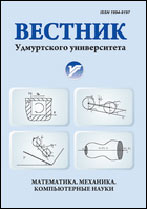|
This article is cited in 4 scientific papers (total in 4 papers)
MATHEMATICS
Regularized classical optimality conditions in iterative form for convex optimization problems for distributed Volterra-type systems
V. I. Suminab, M. I. Suminba
a Tambov State University, ul. Internatsionalnaya, 33, Tambov, 392000, Russia
b Nizhnii Novgorod State University, pr. Gagarina, 23, Nizhny Novgorod, 603950, Russia
Abstract:
We consider the regularization of the classical optimality conditions (COCs) — the Lagrange principle and the Pontryagin maximum principle — in a convex optimal control problem with functional constraints of equality and inequality type. The system to be controlled is given by a general linear functional-operator equation of the second kind in the space $L^m_2$, the main operator of the right-hand side of the equation is assumed to be quasinilpotent. The objective functional of the problem is strongly convex. Obtaining regularized COCs in iterative form is based on the use of the iterative dual regularization method. The main purpose of the regularized Lagrange principle and the Pontryagin maximum principle obtained in the work in iterative form is stable generation of minimizing approximate solutions in the sense of J. Warga. Regularized COCs in iterative form are formulated as existence theorems in the original problem of minimizing approximate solutions. They “overcome” the ill-posedness properties of the COCs and are regularizing algorithms for solving optimization problems. As an illustrative example, we consider an optimal control problem associated with a hyperbolic system of first-order differential equations.
Keywords:
convex optimal control, distributed system, functional-operator equation of Volterra type, ill-posedness, iterative regularization, duality, minimizing approximate solution, regularizing operator, Lagrange principle, Pontryagin maximum principle.
Received: 30.12.2020
Citation:
V. I. Sumin, M. I. Sumin, “Regularized classical optimality conditions in iterative form for convex optimization problems for distributed Volterra-type systems”, Vestn. Udmurtsk. Univ. Mat. Mekh. Komp. Nauki, 31:2 (2021), 265–284
Linking options:
https://www.mathnet.ru/eng/vuu769 https://www.mathnet.ru/eng/vuu/v31/i2/p265
|

|




 Contact us:
Contact us: Terms of Use
Terms of Use
 Registration to the website
Registration to the website Logotypes
Logotypes








 Citation in format
Citation in format 
